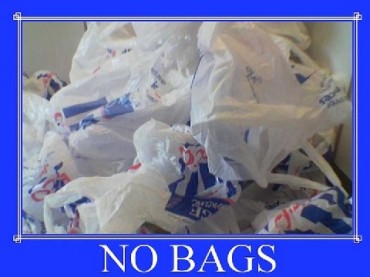
WASHINGTON – A 1-year-old policy that banishes plastic bags from the American University campus’ retail stores continues to remain controversial, with students complaining the rule is onerous, unnecessary and invasive.
The start of each semester is an unwelcome reminder of the aggressive eco-friendly policy, marked by students leaving the bookstore juggling large and heavy stacks of books, or exiting sandwich shops holding their wrapped lunch and hoping napkins don’t fly away as they walk.
And they’re sick of it, based on angry letters to the campus newspaper, rants on an AU blog, a campus news editorial that took a stand against the policy, and grumblings among groups of friends on campus.
“Let me make the choice to save the environment rather than force me to by removing all of my options,” decried one student in an online American University blog post. “Not to mention, I reuse plastic shopping bags all the time.”
The Eagle campus newspaper, in an editorial, also jumped in on the controversy: “ … we think there is a better way of implementing (green efforts). Instead of burdening the student body, let students decide to save the environment. The goal should be to change student’s daily habits rather than force them to adopt new policies. Just because our mothers made us eat vegetables back home doesn’t mean we’re filling our reusable TDR boxes with broccoli.”
It’s unclear whether the policy will be revisited at American University, but it certainly remains unpopular among many. The policy was approved by the student government in 2011 and took effect fall 2012.
In response to the public outcry, members of Eco-Sense, the environmental group on AU’s campus, submitted a letter to the editor to The Eagle student newspaper saying the inconvenience is necessary for “progress.”
“Disposable plastic bags have a destructive impact on waterways and wildlife and the University was right in eliminating these harmful products from our waste stream,” read the letter.
Students, however, continue to ask Eco-Sense for a little common sense.
Additional complaints on “Eagle Rants,” a service of The Eagle that allows students to post anonymous rants online, included this one: “I bet the same stupid people who abolished the use of plastic bags are the same ones that took away a good McDonalds,” wrote a ‘frustrated freshman,’ referring to the closing of an on-campus McDonalds after the expiration of its lease.
Other students echoed similar sentiments on Eagle Rants.
“Let me pay 5 cents to get a freaking plastic bag to cary [sic] stuff,” wrote another student, referring to Washington, D.C.’s 5 cent bag tax. “What if I wasn’t planning on getting my books or some supplies from eagles nest, but i found some free time…sorry i didn’t bring a reusable bag with me.”
What’s more, the science on the issue, inside the beltway and across the nation, is far from settled.
In fact, a 2007 report by San Francisco’s Environment Department said plastic bags from retailers accounted for just 0.6 percent of litter.
And while D.C. officials claim the city’s bag tax has reduced household bag use, a report in The Washington Post says tax data indicates bag usage is steady.
What’s more, policies like the D.C. bag tax and AU bag ban have unintended consequences.
In Ireland, for example, the 2002 tax on plastic bags reduced usage by 90 percent, but drove up sales of packaged plastic bags by about 400 percent, resulting in a net increase in the use of plastic bags.
Studies have also shown that plastic bag bans are dangerous to public health. A 2011 study of reusable bags in California and Arizona found 51 percent of reusable shopping bags contained bacteria. A study from 2012 reported that E. coli-related emergency-room visits increased in San Francisco after its ban.
College Fix contributor Josh Kaib is a student at American University.
IMAGE: Didbygraham/Flickr
Like The College Fix on Facebook / Follow us on Twitter





Please join the conversation about our stories on Facebook, Twitter, Instagram, Reddit, MeWe, Rumble, Gab, Minds and Gettr.